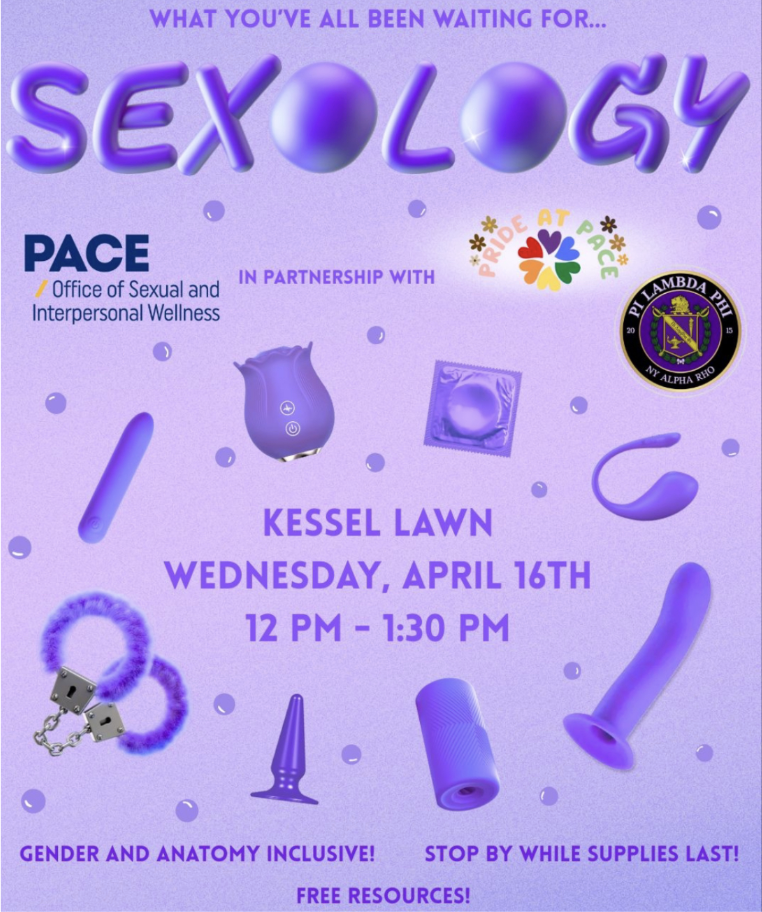At the heart of any institution dedicated to learning and growth is the principle of mutual respect–respect for differences in thought, identity, and belief. That’s why I want to begin this piece with clarity: we, as an institution, and I, as a person, fully support the right of every student to practice their religion freely and without shame. Religious expression is a fundamental right, one that I will always defend. But that right has limits, especially when it begins to infringe on the rights and dignity of others. What occurred during the Office of Sexual and Interpersonal Wellness’s (OSIW) annual Sexology event in Kessel Boudreau Lounge (which was previously scheduled to be hosted on Alumni Lawn but moved indoors due to windy conditions) crossed that line.
Sexology, hosted by OSIW along with Pride at Pace and Pi Lambda Phi, was designed to be a safe and affirming space–one where community partners could share resources, and students could explore topics of identity, health, and intimacy without fear of judgment or shame. Unfortunately, that vision was disrupted by a protest led by students from the organizations CRU and Women of the Word, who entered the space with open Bibles, stopped participants from engaging with the giveaway table, and directly confronted attendees, staff, and even guests from outside the university.
This behavior did not emerge from nowhere. It followed a wave of hateful comments, the comment section eventually closed on a promotional Instagram post shared by OSIW and Pride at Pace. These digital comments set the tone for what was to come–a demonstration not of peaceful coexistence, but of confrontation and condemnation. The physical presence of the protesters, along with language like “desires of the flesh” and “are you okay with going to hell?” was not only disrespectful, but also deeply inappropriate given the setting.
According to multiple witnesses, including students working the event, demonstrators stated they hoped to “shut it down” and turn people away.
One volunteer, who has chosen to remain anonymous, stated, “I was with my club and patrolling around to make sure everyone was staying in line. Me and another member were approached by two guys who claimed to be spreading the word of God. They were very obviously trying to persuade us from engaging in Sexology. I mentioned that I went through confirmation myself and that I took about seven years of religious classes. In response, they told me I should understand what they’re talking about, and I said no, wagging my finger, and I walked away, pulling my clubmate away with me. They continued going around talking to other students with the same purpose of shaming people away from Sexology, but I stopped paying any mind to them.”
Let me be clear: it is never acceptable to weaponize religion as a tool of judgment or intimidation, especially not in spaces where people are meant to feel safe, seen, and supported. The fact that some students felt harassed or too uncomfortable to remain at the event is a failure that reflects directly on the choices made by those demonstrators.
Religious conviction does not grant the right to interfere with others’ freedoms, especially not under the guise of moral superiority. Bringing scripture into a space where it was neither requested, needed, nor (frankly) welcome, while blocking tables, confronting attendees, and ultimately contributing to the early end of the event, was not just misguided, it was harmful and quite honestly un-Christian.
No one is asking these students to silence their faith. But practicing your religion does not mean imposing it on others, particularly in moments that are deliberately designed for education, support, and inclusion. There is a time and place for religious discourse–for example, at CRU or Women of the Word meetings, worship nights, bible studies, prayer circles, and personal conversations. A sexology event, hosted to serve the community, explore their identities and sexuality SAFELY (at such a crucial point in their lives, being at college), was not one of those places.
We will always advocate for students’ rights to express themselves, including their religious identities. But that advocacy comes with an expectation: that your freedom will not be used as a weapon against someone else’s. Bringing your beliefs into someone else’s safe space uninvited is not courage. It’s coercion.
So, let this be a turning point. Not toward division, because we all know there’s enough of that to fill the Earth twice, but toward understanding where boundaries lie, and why they matter. You are free to believe. But belief should never be a bludgeon. And it certainly has no place at an event where its presence silences others.
This isn’t about religion versus anything. It’s about mutual respect. A two-way street.

